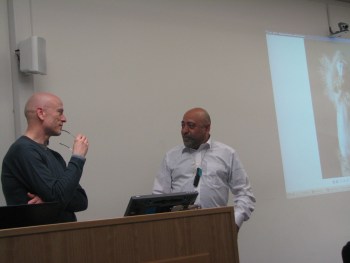
(download an information pdf)
Two of the broad aims of Storying Sheffield are: to open up opportunities and resources in Higher Education for more people; and for the University of Sheffield and its students to learn from the experience and knowledge of the people of the city and region. The project uses accessible and universal ideas such as narrative, storytelling, history, and the environment as ways of engaging with a diverse range of people including long-term users of mental health services, people with physical disabilities, older people, primary school students, patients in secure hospitals, and others.

Through engaging with these accessible concepts, participants on our initiatives are introduced to a variety of themes. These have included: the history of film; local, regional and national history; architecture, engineering, and the built environment; design; theories of space and mapping; IT and multimedia production; concepts of identity; the sociology of objects; visual arts; creative writing; non-fictional writing; performance; community work; photography; and many more. Building on these introductions, our initiatives also support participants in using aspects of their learning to construct their own narrative artefacts, in which they critically examine contemporary life and identity – with their productions showcased at a variety of public events.
Storying Sheffield now encompasses a wide range of initiatives, but a central activity is an innovative course based in the School of English at The University of Sheffield. It is a unique venture in British higher education in which undergraduate students and people from the city from disadvantaged backgrounds are working and studying together to produce, record, and collect stories and many other diverse representations of the lives of Sheffield people, and the ‘life’ of Sheffield. This initiative works chiefly with people who have long-term mental health problems and/or physical disabilities.

The Storying Sheffield project is underpinned by the idea that ‘education’, in addition to the dissemination of skills and ideas, can benefit participants through offering them new frames of reference and critical skills. It also connects them to, and makes accessible, various resources and people who are able to assist and advise them if they are interested in continuing further in education, taking up volunteering or employment opportunities, or developing new interests.
The Storying Sheffield project is diversifying and growing; it is working on arts and education initiatives with a number of partner organisations and groups, including Sheffield Health and Social Care NHS Foundation Trust, Museums Sheffield, Sheffield City Council Education & Arts, Nottinghamshire Healthcare NHS Foundation Trust, and a variety of community cohesion initiatives. We also work in partnership with local artists and others from the creative industries. Our projects have worked with many different groups of people including people who are long-term users of mental health services, people with physical disabilities, older people, some who live with dementia, primary school students, new migrants to the UK, patients in secure hospitals, and others.

By engaging with Sheffield’s citizens and communities, especially those whose members’ voices are rarely heard, Storying Sheffield is creating a living and dynamic portrait of everyday life in a major British city. It is enabling Sheffield people to benefit from the resources of the University, and for undergraduates to learn from the lived expertise and experience of the people of Sheffield. We are also building a collection or web of fragments, stories, and representations, or, to use a phrase from the philosopher Paul Ricoeur, “a cloth woven of stories told”.
